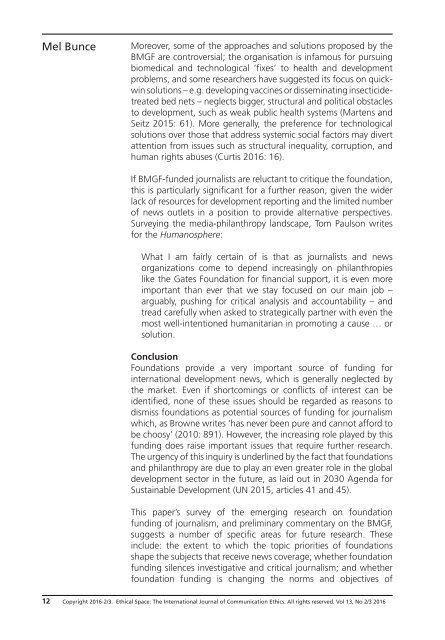Beyond clickbait and commerce
v13n2-3
v13n2-3
Create successful ePaper yourself
Turn your PDF publications into a flip-book with our unique Google optimized e-Paper software.
Mel Bunce<br />
Moreover, some of the approaches <strong>and</strong> solutions proposed by the<br />
BMGF are controversial; the organisation is infamous for pursuing<br />
biomedical <strong>and</strong> technological ‘fixes’ to health <strong>and</strong> development<br />
problems, <strong>and</strong> some researchers have suggested its focus on quickwin<br />
solutions – e.g. developing vaccines or disseminating insecticidetreated<br />
bed nets – neglects bigger, structural <strong>and</strong> political obstacles<br />
to development, such as weak public health systems (Martens <strong>and</strong><br />
Seitz 2015: 61). More generally, the preference for technological<br />
solutions over those that address systemic social factors may divert<br />
attention from issues such as structural inequality, corruption, <strong>and</strong><br />
human rights abuses (Curtis 2016: 16).<br />
If BMGF-funded journalists are reluctant to critique the foundation,<br />
this is particularly significant for a further reason, given the wider<br />
lack of resources for development reporting <strong>and</strong> the limited number<br />
of news outlets in a position to provide alternative perspectives.<br />
Surveying the media-philanthropy l<strong>and</strong>scape, Tom Paulson writes<br />
for the Humanosphere:<br />
What I am fairly certain of is that as journalists <strong>and</strong> news<br />
organizations come to depend increasingly on philanthropies<br />
like the Gates Foundation for financial support, it is even more<br />
important than ever that we stay focused on our main job –<br />
arguably, pushing for critical analysis <strong>and</strong> accountability – <strong>and</strong><br />
tread carefully when asked to strategically partner with even the<br />
most well-intentioned humanitarian in promoting a cause … or<br />
solution.<br />
Conclusion<br />
Foundations provide a very important source of funding for<br />
international development news, which is generally neglected by<br />
the market. Even if shortcomings or conflicts of interest can be<br />
identified, none of these issues should be regarded as reasons to<br />
dismiss foundations as potential sources of funding for journalism<br />
which, as Browne writes ‘has never been pure <strong>and</strong> cannot afford to<br />
be choosy’ (2010: 891). However, the increasing role played by this<br />
funding does raise important issues that require further research.<br />
The urgency of this inquiry is underlined by the fact that foundations<br />
<strong>and</strong> philanthropy are due to play an even greater role in the global<br />
development sector in the future, as laid out in 2030 Agenda for<br />
Sustainable Development (UN 2015, articles 41 <strong>and</strong> 45).<br />
This paper’s survey of the emerging research on foundation<br />
funding of journalism, <strong>and</strong> preliminary commentary on the BMGF,<br />
suggests a number of specific areas for future research. These<br />
include: the extent to which the topic priorities of foundations<br />
shape the subjects that receive news coverage; whether foundation<br />
funding silences investigative <strong>and</strong> critical journalism; <strong>and</strong> whether<br />
foundation funding is changing the norms <strong>and</strong> objectives of<br />
12 Copyright 2016-2/3. Ethical Space: The International Journal of Communication Ethics. All rights reserved. Vol 13, No 2/3 2016


